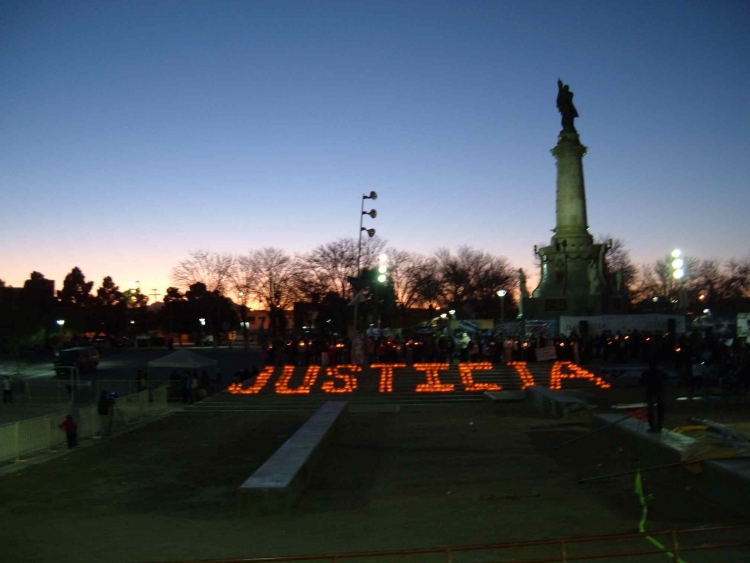
New executive order doubles down on failed policies that drove crime, violence, and human rights violations in Mexico.
Amid the turbulence of recent weeks, a lot of us have struggled to absorb the portent of all the Trump administration’s actions. Of three executive orders issued by the White House on Feb. 9, for example, most news stories focused on the orders' false claims about crime within the United States, border militarization, and protection of U.S. police.
But the executive order Trump issued on transnational crime that day has received little attention. That order would escalate U.S. support for the drug war in Mexico and Central America by stepping up military and police aid and involvement.
Like many of the new administration's actions, the drug war order is also built upon what came before. Since 2007, the United States has spent $2.5 billion in equipment and training for Mexican military and police forces as part of the Merida Initiative, aimed at reducing drug trafficking and organized crime. In 2014, in the name of responding to the arrival of Central American families, especially unaccompanied minors at the U.S. border, Washington doubled its counter-drug police funding to Central American countries, while also supporting Mexico to detain and deport migrants from southern Mexico.
Trump's Feb. 9 order doesn’t create new programs, but it does order new resources. The Obama administration had already funded training of Mexican immigration enforcement agents by the Department of Homeland Security (DHS). DHS and its new secretary, Gen. John Kelly, have a growing role in shaping U.S. policy and actions in Mexico and Central America.
The executive order appears to be the direct expression of Trump's offer to send U.S. military support to go after "bad hombres" in Mexico. Up to now, the State Department has been the lead U.S. agency in the drug war, with participation by the Pentagon and a panoply of other federal agencies. The new executive order disturbingly signals the growing role of the Justice Department and DHS in the Trump administration's strategy. The order specifically names a task force and intelligence center in the Department of Justice, now run by Jeff Sessions, who has long been an aggressive foe of immigrant rights.
Kelly, now head of DHS, served as chief of the U.S. Southern Command from 2012 through 2015 and has been dismissive of human rights restrictions on military assistance. He called the influx of migrants from Latin America an "existential threat" to the United States. When he said this in 2014, one-third of all migrants arriving at the U.S. southern border were families or children on their own. Kelly still classifies all undocumented migrants as threats to the United States.
When Kelly names someone as a potential terrorist, watch out. Here's what he said about the "war on terrorism" in 2010:
"Our enemy is savage, offers absolutely no quarter, and has a single focus and that is either kill every one of us here at home, or enslave us. … We have a saying in the Marine Corps and that is 'no better friend, no worse enemy, than a U.S. Marine.'… If it’s death they want, it's death they will get, and the Marines will continue showing them the way to hell if that's what will make them happy."
In the extensive speech that included this statement, he never said who, exactly, that enemy is. In a drug war that has victimized many people of color, bystanders, journalists, social activists, and drug users, as well as people who have committed crimes, such a provocative declaration about "enemies" is likely to sweep many other people into its proposed violence.
The executive order comes as Mexican legislators debate a controversial proposal that would authorize deployment of the army in Mexican cities and streets to conduct law enforcement (the Ley de Seguridad Interior).
The order also follows on the heels of two new powerful reports in Mexico that confirmed that the military approach led to dramatic increases in criminal cartel activity, as well as spikes in homicides and human rights violations.
The Mexican Senate's investigative agency confirmed previous studies showing a pattern of dramatically increased allegations of human rights violations and homicides after 2007, when the Mexican military was deployed for ongoing anti-crime operations, and especially in those cities where the military’s counter-drug operations were concentrated. The other report, from the respected Center for Economic Research and Development, found that criminal groups increased by 900 percent during 2006-2012, when this strategy was carried out most intensively, and when it received the most U.S. assistance.
The lethal business model of these strengthened criminal and military organizations collides with the increased flow of Central American families who are fleeing into Mexico from arguably greater levels of brutality in El Salvador, Honduras, and Guatemala.
Trump's executive order is an announcement that the new presidency will repeat an experience that was disastrous for many Mexicans and Central Americans. It is no wonder, then, that people in Mexico have already mobilized against the Trump presidency in large numbers, including a march of tens of thousands on Feb. 19, with remarkable unity across deep political differences.
We will be all the more powerful if we work together, across national boundaries, to claim a space for compassionate and just responses to crime and narcotics in each of our countries.
To stay tuned to what's occurring in Mexico and U.S. policy, see the Mexico Voices news digest blog, and AFSC's Stop Arms page.
John Lindsay-Poland coordinates the AFSC Wage Peace program in San Francisco.